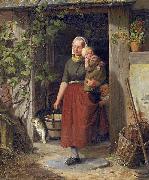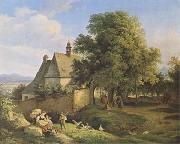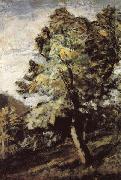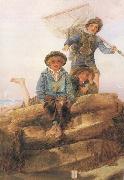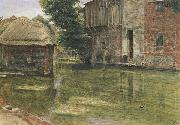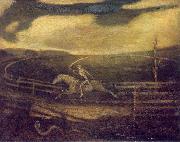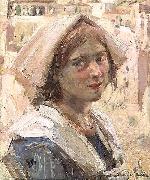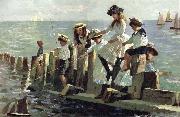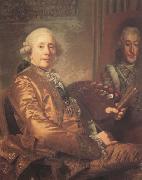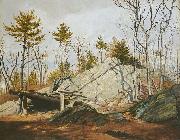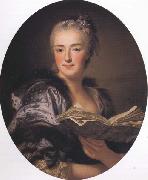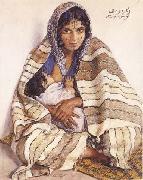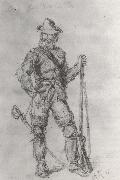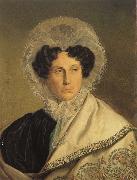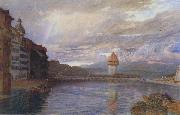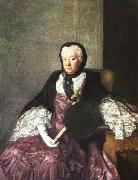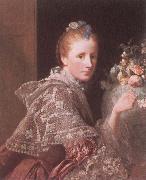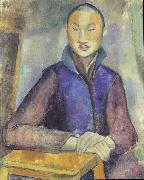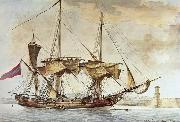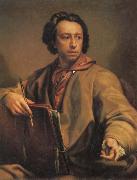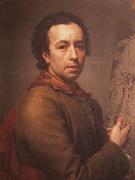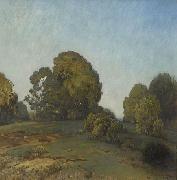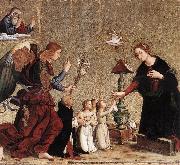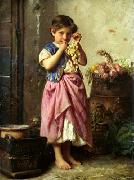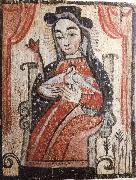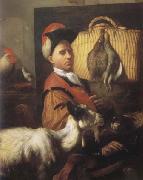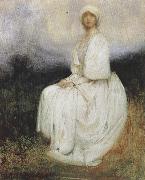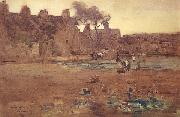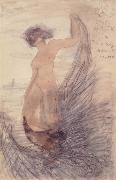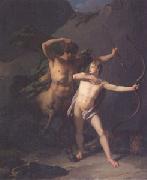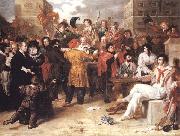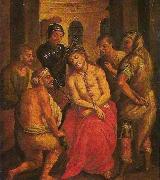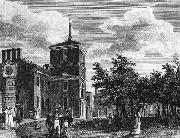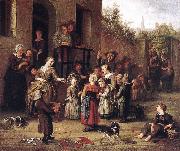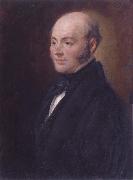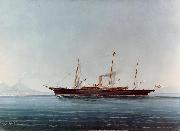|
|
|
|
|
|
|
|
|
|
|
|
|
|
|
|
|
|
|
|
|
|
|
|
|
|
|
|
|
|
|
|
|
|
|
|
|
|
|
|
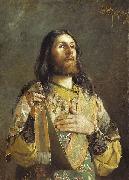 |
Andrei Ryabushkin
|
|
(Russian:29 October [O.S. 17 October] 1861 - 10 May [O.S. 27 April] 1904) was a Russian painter. His major works were devoted to life of ordinary Russians of the 17th century.
Andrey Petrovich Ryabushkin was born in the village Stanichnaya sloboda, Borisoglebskiy uezd, Tambov gubernia in 1861. His father and brother were icon painters, and he started to help them from his early childhood. At 14 years old he became an orphan. A student of Moscow School of Painting, Sculpture and Architecture A. Kh. Preobrazhensky, who spent the summer in the village, happened to see the boyes drawings and was greatly impressed by them. He started to give him lessons and helped him to enter the Moscow School of Painting, Sculpture and Architecture. Ryabushkin was one of the youngest student of the school at all times.
Ryabushkin stayed for seven years (1875-82) in the Moscow School, learning from Vasily Perov and Illarion Pryanishnikov. His first large work Peasant Wedding was bought by Pavel Tretyakov in 1880. After the death of Vasiliy Perov, Ryabushkin moved to Saint Petersburg in 1882, and entered the Imperial Academy of Arts where he learned from Pavel Chistyakov. The classes soon disappointed him, however, and he began to spend more and more time either in the library of the academy or sketching in the streets.
His studies at the academy came to an end in 1892. He did not receive an award for his diploma work, Descent from the Cross, as was expected, because he did not follow the approved project. But the work was so good that the president of the academy, Grand Duke Vladimir Konstantinovich, provided Ryabushkin with a stipend for travel and studies abroad from his own means. Instead of going to Italy or Paris, Ryabushkin chose to make a tour of ancient Russian towns (Novgorod, Kiev, Moscow, Uglich, Yaroslavl). The inhabitants of them became his first models and his first critics. |
|
|
|
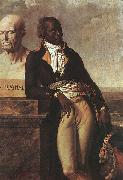 |
Anne-Louis Girodet de Roussy-Trioson
|
|
(also given as Anne-Louis Girodet de Roucy-Triosson, Anne-Louis Girodet-Trioson) January 5, 1767 - December 9, 1824), was a French painter and pupil of Jacques-Louis David, who was part of the beginning of the Romantic movement by adding elements of eroticism through his paintings. Girodet is remembered for his precise and clear style and for his paintings of members of the Napoleonic family.
|
|
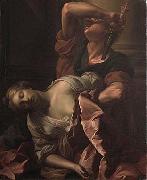 |
Antoine Rivalz
|
|
(1667, Toulouse - 1735) was a French painter. The son of Jean-Pierre Rivalz (who painted and designed the city's hôtel de ville), Antoine was the official painter to the town of Toulouse, a talented portraitist of the society of the city in the 18th century. He also produced a large number of drawings.
Antoine Rivalz began his training in the studios of his father Jean-Pierre, the sculptor Marc Arcis and the artist Raymond Lafage. In his training, he was particularly interested in studying classical works and the Baroque Italian masters. From 1685 to 1687 he trained at the Academie royale de peinture et de sculpture in Paris. On his return to Toulouse he received his first two commissions. In 1687 he set out for Rome, where he stayed for more than ten years. In 1694 he won second prize at the Accademia di San Luca with a drawing of The fall of the giants, with first prize going to Antonio Balestra and Felice Nardi. In Rome he became friends with other artists such as Carlo Maratta, Luigi Garzi and Benedetto Luti, and was more and more in demand for commissions from families in both Rome and Toulouse.
In 1703, he returned to Toulouse and was made painter of the city's hôtel de ville, a post he held until his death. Supported by an important studio, he received a large number of commissions - commemorative paintings, paintings of ordinance and armour, architectural projects, restorations. This post, however, allowed him above all to forge productive relations with the city's upper classes and benefit from a near-monopoly on public, religious and private commissions in the city.
He married his first cousin Louise Rivalz, with whom he had six children, including the future artist Pierre Rivalz, known as the "chevalier Rivalz". In 1726 he set up Toulouse's first art school and in 1750 letters patent from Louis XV turned it into the Academie royale de peinture et de sculpture de Toulouse, the only one in France (after that in Paris) to be allowed to bear that title.
|
|
|
|
|
|
|
|
|
|
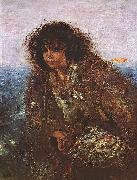 |
Anton Romako
|
|
(October 20, 1832 - March 8, 1889) was an Austrian painter.
Anton Romako was born in Atzgersdorf (now a district of Liesing, Vienna), as an illegitimate son of factory owner Josef Lepper and his housemaid Elisabeth Maria Anna Romako. He studied painting at the Academy of Fine Arts Vienna (1847-49) but his teacher, Ferdinand Georg Waldmeller, considered him talentless. Later, he studied in Munich (1849) under Wilhelm Kaulbach, and subsequently in Venice, Rome and London. In the early 1850s he studied privately in Vienna under Carl Rahl, whose style Romako adopted. In 1854 he began travels to Italy and Spain and in 1857 settled in Rome as the favourite portrait, genre, and landscape painter for the local colony of foreigners.
In 1862 Romako married Sophie Köbel, the daughter of architect Karl Köbel, and the pair had five children before Sophie left Romako in 1875 for her lover. In 1876 Romako returned to Vienna but failed to re-establish himself against the style representend by Hans Makart and increasingly relied on the charity of such wealthy patrons as Count Kuefstein. He made study trips to Hungary, Italy and France, and during the years 1882-84 he alternated between Paris and Geneva. Two daughters, Mathilde and Mary, committed suicide in 1887; Romako had never recovered from the shock. His last years were spent living in neglect near Vienna, where he died in poverty in 1889. Romako was buried at the Central cemetery in Vienna.
In 1953 a street in Atzgersdorf was named after the painter: Romakogasse. Anton Romako's painting "The battle of Lissa" was selected as a motive for a recent commemorative coin: the 20 euro S.M.S. Erzherzog Ferdinand Max minted on September 15, 2004.
His brother, Joseph von Romako, was a Naval Architect-Inspector of Austro-Hungarian Navy.
|
|
|
|
|
|
|
|
|
|
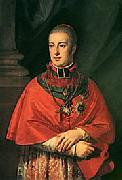 |
Archduke Rudolf of Austria
|
|
Rudolf Johannes Joseph Rainier von Habsburg-Lothringen, Archduke and Prince Imperial of Austria, Prince Royal of Hungary and Bohemia (8 January 1788 - 24 July 1831) was a Cardinal, an Archbishop of Olomouc, and a member of the House of Habsburg-Lorraine.
Born in Pisa, Italy, he was the youngest son of Emperor Leopold II and Maria Louisa of Spain. He was elected archbishop of Olomouc in 1819 and became cardinal in the year 1820.
In 1803 or 1804, Rudolf began taking lessons in piano and composition from Ludwig van Beethoven. The two became friends, and Rudolph became a supporter and patron of Beethoven; their meetings continued until 1824. Beethoven dedicated 14 compositions to Rudolph, including the Archduke Trio, the Hammerklavier Sonata, the Emperor Concerto and the Missa Solemnis. Rudolph, in turn, dedicated one of his own compositions to Beethoven. The letters Beethoven wrote to Rudolph are today kept at the Gesellschaft der Musikfreunde in Vienna.
On 24 March 1819 he was appointed, at the age of 31, Archbishop of Olomouc in the present day Czech Republic but then part of the Austrian Empire. He was made Cardinal-Priest of the titular church of S. Pietro in Montorio by Pope Pius VII on 4 June 1819. He was ordained a priest on 29 August 1819, and consecrated a bishop on 26 September.
In 1823 - 24, he was one of the 50 composers who composed a variation on a waltz by Anton Diabelli for Vaterländischer Kenstlerverein. In Rudolf's case, the music was published anonymously, as by "S.R.D" (standing for Serenissimus Rudolfus Dux).
|
|
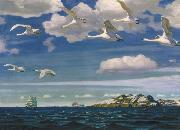 |
Arkady Alexandrovich Rylov
|
|
Arkady Alexandrovich Rylov (Russian, 29 January [O.S. 17 January] 1870 - June 22, 1939) was a Russian and Soviet Symbolist painter.
Biography
Rylov was born in the village Istobenskoye, Vyatka gubernia. He was brought in the family of his stepfather, a notary (Rylov's father had a psychiatric illness). He moved to Saint Petersburg and studied at the Technical Design School of Baron Schtiglitz (1888-1891), then at the Imperial Academy of Arts under Arkhip Kuindzhi (1894-1897).
In the Blue Expanse, 1918Rylov was a member of the Mir iskusstva movement and its spin-off Union of Russian Artists also a member of the Association of Artists of the Revolutionary Russia. He was a chairman of the Kuindzhi Society. |
|
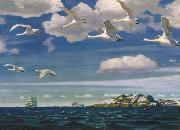 |
Arkady Rylov
|
|
(Russian: 29 January 1870 - June 22, 1939) was a Russian and Soviet Symbolist painter.
Rylov was born in the village Istobenskoye, Vyatka gubernia. He was brought in the family of his stepfather, a notary (Rylov's father had a psychiatric illness). He moved to Saint Petersburg and studied at the Technical Design School of Baron Schtiglitz (1888-1891), then at the Imperial Academy of Arts under Arkhip Kuindzhi (1894-1897).
Rylov was a member of the Mir iskusstva movement and its spin-off Union of Russian Artists also a member of the Association of Artists of the Revolutionary Russia. He was a chairman of the Kuindzhi Society.
He started as a historical painter (his graduation work in the Imperial Academy of Arts was Assault of Pechenegs on a Slav village but became a predominately landscape painter. Still many of his paintings have some allusions with Russian history.
Many of his landscapes painted after the October Revolution were seen as symbols of the revolutionary Freedom. At that time he also painted some typical Socialist Realism compositions like Lenin in Razliv. He taught in the Academy of Arts. In his studio he created almost a small nature reserve. There lived squirrels, rabbits, monkey Manka and many wild birds (without cages) and two anthills. According to Mikhail Nesterov wild animals and birds loved Rylov and often came to his studio.
|
|
|
|
|
|
|
|
|
|
|
|
|
|
|
|
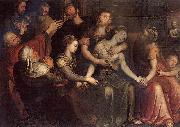 |
Bernaert de Ryckere
|
|
Bernaert de Rijckere (c1535, Kortrijk - 1590, Antwerp), was a Flemish Renaissance painter.
According to Karel van Mander he was born in Kortrijk and was admired there for an altarpiece depicting Christ bearing the cross, which he made for the St. Marten's church of the brothers of the Cross there. He later took on a different style that Karel van Mander had heard of but had not seen to be able to judge it for himself. He said he moved to Antwerp and joined the Guild of St. Luke there in 1561.
According to the Netherlands Institute for Art History he was the teacher of his son, the painter Abraham de Rijcke, and is known for landscapes and historical allegories. |
|
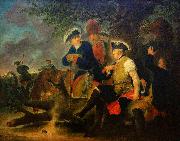 |
Bernhard Rode
|
|
Bernhard Rode (25 July 1725 - died 28 June 1797) was a Prussian artist and engraver well-known for portraying historical scenes and allegorical works. He knew most of the central figures in the Berlin Enlightenment as Friedrich Nicolai and Gotthold Lessing, and the philosophical and political discussions of the Berlin Philosophs informed much of the subject matter of his artistic work. His paintings include several works depicting, in various guises, the King of Prussia Frederick the Great, who ruled the Prussia during much of Rode's lifetime. Rode was director of the Berlin Academy of the Arts from 1783 until his death in 1797.
Rode was the son of a goldsmith Christian Bernhard Rode and his wife, Anna Sophie. The copper engraver Johann Heinrich Rode and the sculptor Philipp Rode were his brothers. He received his earliest artistic training from his father and his earliest training in drawing from a painter, N. Meller. His four-year education at the studio of the court painter Antoine Pesne, an influential painter in Berlin and Brandenburg, was important to his professional development. During his apprenticeship, he learned to paint portraits. In 1748, Rode began a study trip of several years. He spent 18 months in the studio of Jean Restout and Charles Andre van Loo (sometimes known as Carle van Loo or Vanloo). He became acquainted with Jean-Baptiste Deshayes and developed his talent and interest in the medium of history painting. In Venice and Rome, he studied the old masters. In 1755 or 1756, he returned to Berlin, and he married Sophie Luise, but the earliest years of their marriage remained childless. |
|
|
|
|
|
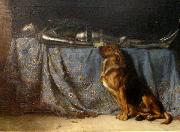 |
Briton Riviere
|
|
(14 August 1840 C 1920) was an Irish artist born in London, England.
His father, William Riviere, was for some years drawing-master at Cheltenham College, and afterwards an art teacher at Oxford University. He was educated at Cheltenham College and at Oxford, where he took his degree in 1867. For his art training he was indebted almost entirely to his father, and early in life made for himself a place of importance among the artists of his time.
His first pictures appeared at the British Institution, and in 1857 he exhibited three works at the Royal Academy, but it was not until 1863 that he became a regular contributor to the Academy exhibitions. In that year he was represented by "The Eve of the Spanish Armada", and in 1864 by a "Romeo and Juliet". Subjects of this kind did not, however, attract him long, for in 1865 he began, with a picture of a "Sleeping Deer-hound", a series of paintings of animal-subjects which later occupied him almost exclusively.
|
|
|
|
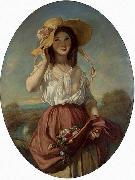 |
Camille Roqueplan
|
|
Camille Joseph Etienne Roqueplan, 18 February 1802 in Mallemort; † 30 September 1855 in Paris) was a French painter.
|
|
|
|
|








